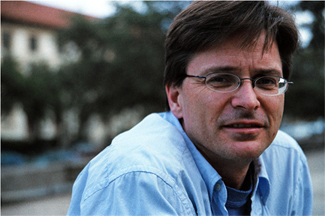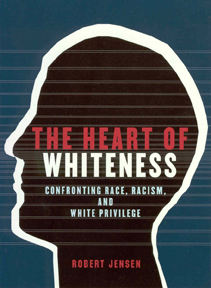In 1959, John Howard Griffin, a Caucasian American, successfully masqueraded as an African American and traveled anonymously throughout the South. He published his experiences with racism in the classic book, “Black Like Me.”
 Robert Jensen, Ph.D., associate professor, School of Journalism, University of Texas at Austin, also has written a book about skin color in American society – the unseen and unspoken privileges that are accorded simply because one has white skin.
Robert Jensen, Ph.D., associate professor, School of Journalism, University of Texas at Austin, also has written a book about skin color in American society – the unseen and unspoken privileges that are accorded simply because one has white skin.
But Dr. Jensen is not an African-American who “passed” as white – he is Caucasian. His new book, “The Heart of Whiteness: Confronting Race, Racism and White Privilege” (City Lights, 2005), is a rarely published perspective on contemporary racial relations in America.
Dr. Jensen will be the guest speaker for the 2006 Dr. Martin Luther King Jr. Holiday commemoration, sponsored by UNMC and The Nebraska Medical Center. The program is titled, “This Skin I’m In: Robert Jensen on White Privilege in America.”
 |
Copies of “The Heart of Whiteness” will be available for purchase after Dr. Jensen’s presentation. He will stay to sign all copies distributed at the program. |
Also co-sponsored by the Employee Diversity Network, the program will be Monday, Jan. 16, from noon to 1 p.m. in the Storz Pavilion, located on the lower level of the Clarkson Tower. The program is free and open to the public, as well as all to campus staff, faculty and students. In addition, free lunch refreshments will be served to the first 250 people.
In “The Heart of Whiteness,” Dr. Jensen offers the following as a more truthful introduction to his upbringing:
“I was born in a small city in North Dakota, to white parents in the lower middle class who eventually scratched their way to a comfortable middle class life through hard work. The city I grew up in was almost all white. It was white because the indigenous population that once lived there was either exterminated or pushed onto reservations.I was educated in a well-funded and virtually all-white school system, where I was taught a variety of skills, including how to take standardized tests written by and for white people. In those schools my accomplishments were applauded and could be seen as part of a long line of accomplishments of people who looked like me. I mostly studied the history of people who looked like me.
“I worked in part-time and summer jobs for which I was hired by other white people. I went to college in mostly white institutions. I had mostly white professors. I graduated and got jobs. In every job I have ever had, I was interviewed by a white person. Every boss I have ever had (until my current supervisor, who was hired three years ago) has been white.I have made many mistakes in my life. But to the best of my knowledge, when I screwed up in my school or work life, no one has ever suggested that my failures were in any way connected to my being white.”
Dr. Jensen joined the UT faculty in 1992 after completing his Ph.D. in media law and ethics in the School of Journalism and Mass Communication at the University of Minnesota. Prior to his academic career, he worked as a professional journalist for a decade. He teaches graduate and undergraduate courses in media law, ethics and politics. Dr. Jensen also is director of the Senior Fellows Program, the honors program of the UT College of Communication.
In his research, Dr. Jensen addresses questions of race through a critique of white privilege and institutionalized racism. In addition to teaching and research, Dr. Jensen writes for popular media, both alternative and mainstream. His opinion and analytic pieces on such subjects as foreign policy, politics, and race have appeared in papers, magazines and numerous online publications around the country.
Dr. Jensen also is the author of “Citizens of the Empire: The Struggle to Claim Our Humanity” (City Lights, 2004); and “Writing Dissent: Taking Radical Ideas from the Margins to the Mainstream” (Peter Lang, 2002); co-author with Gail Dines and Ann Russo of “Pornography: The Production and Consumption of Inequality” (Routledge, 1998); and co-editor with David S. Allen of “Freeing the First Amendment: Critical Perspectives on Freedom of Expression” (New York University Press, 1995).